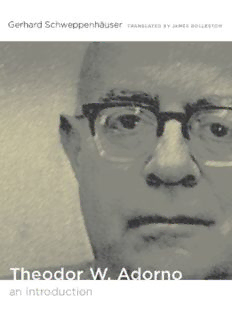
Theodor W. Adorno : an introduction PDF
Preview Theodor W. Adorno : an introduction
Theodor W. Adorno an introduction Post-Contemporary Interventions Theodor W. Adorno an introduction Gerhard Schweppenhauser Translated by James Rolleston Duke University Press Durham and London 2009 © 2009 Duke University Press All rights reserved Printed in the United States of America on acid-free paper ∞ Designed by C. H. Westmoreland Typeset in Warnock with Gotham display by Keystone Typesetting, Inc. Library of Congress Cataloging-in-Publication Data appear on the last printed page of this book. The publication of this work was supported by a grant from the Goethe-Institut. CONTENTS Preface to the English Edition Translator’s Preface 1: The Project of Renewing Childhood by Transforming One’s Life 2: Critical Theory 3 Reason’s Self-Criticism Defined Negation The Two Faces of Enlightenment 4: Rescuing What is Beyond Hope Philosophy from the Perspective of Redemption Primacy of the Object 5: The Totally Socialized Society The Concept of Society Liquidation of the Individual Critical Theory on Morality 6: The Goal of the Emancipated Society 7: The Powerless Utopia of Beauty The Destruction and Salvation of Art The Silence of Music The Transition from Art to Knowledge Theorizing Art and Culture in the Institute for Social Research Benjamin and Kracauer: Theorizing Mass Art Anarchistic and Bourgeois Romanticism: Adorno’s Critique of Benjamin The Work of Art and the Concept of Truth 8: The Failure of Culture The Radically Pathetic and Guilty Culture Enlightenment as Mass Deception Biographical Timeline Notes Bibliography Selected Works by Adorno in English English Editions of Core Cited Twentieth-Century Texts Selected Secondary Works on Adorno Preface to the English Edition THIS BOOK AIMS TO PRESENT some of the main motifs of Adorno’s critical theory in a concise and clear manner. The presentation starts from the core concepts of his philosophy and shows how they are developed in the framework of sociology as well as that of aesthetic and cultural theory. I refer constantly to Adorno’s Minima Moralia and his Negative Dialectics: together with his contribution to Dialectic of Enlightenment, these constitute, when we think of his work systemically, his most important achievements. From this perspective I have outlined the thought patterns I see as essential, as sustaining and shaping the complex and highly differentiated structure of Adorno’s philosophy. Inevitably I have neglected elements which would surely be essential to a comprehensive portrayal of Adorno’s multilayered thinking. And I have not been able to do full justice to the multifaceted dimensions of the history of thought, in which Adorno’s intellectual odyssey is embedded. This odyssey begins with neo-Kantian positions, moving through a preoccupation with Husserl’s phenomenology—decisively influenced by the philosophical avant-garde of Lukács, Bloch, and Benjamin—to an engagement with Freud and Kierkegaard. Adorno’s intellectual journey leads him to Hegel, Marx, and Nietzsche, and later culminates in his critique of Heidegger, but always ultimately permits him to return to Kant. Not all of this is reconstructed here; where necessary, it can be read back into the intellectual outcomes. Moreover, experts in music theory will hardly be satisfied with the brevity with which I have discussed Adorno’s philosophy of music, while for lay people too many questions in this field will remain open. My decision to weight matters in this way reflects the fact that this book is intended as a philosophical introduction to Adorno’s thought, not as a comprehensive portrayal of the theoretical cosmos of a thinker who today is often called the last universal genius. Recent monographs in German are available that portray him in his entirety; particularly noteworthy is Detlev Claussen’s study, published in 2003, the year of Adorno’s centenary. I hope that my more selective portrayal will help render accessible Adorno’s thinking, which is consistently critical of systems but in no way unsystematic. My study concentrates on a series of core philosophical concepts, using these as a base from which to trace Adorno’s perspective when he deploys these concepts in fields such as the aesthetics of music and literature. The web of philosophical history into which Adorno’s thinking opens—he gave life and power to the history of ideas in a way matched by few twentieth-century thinkers—is here brought to life only indirectly. But it is present as a subtext. This allusive method has found resonance among German-speaking readers, thereby seeming to justify my methodological decision. For the present English-language edition I have expanded the text in several places. I have incorporated thinking from three essays that I first published in 2003 and 2005, in the Zeitschrift für kritische Theorie and in the collection Modelle kritischer Gesellschaftstheorie. At this point I would like to thank my father, Hermann Schweppenhäuser, for his multifaceted introduction, over many years, to critical theory. I wish to acknowledge with gratitude how important reading Negative Dialectics with Sven Kramer in the late 1980s has been for my interpretation of Adorno. And I thank Herbert Schnädelbach, with whom I studied philosophy in Hamburg in the 1980s, for inviting me in 1995 to write this book for the series of ‘‘introductory’’ volumes he directed at Hamburg’s Junius-Verlag. Another contributor to this constellation was the philosopher Detlef Horster from Hanover, also a member of the advisory board for the Hamburg series, who has been my friend since my participation in the philosophy seminar at the University of Hanover. To Fredric Jameson, with whom I have had many conversations during and since my time as visiting professor in Duke University’s literature program, I owe insights into new ways of reading and contextualizing Adorno’s aesthetics and cultural theory. And I am especially glad that James Rolleston has taken on the task of translating the book; with him I know my text is in good hands. GERHARD SCHWEPPENHÄUSER Weimar, July 2006
